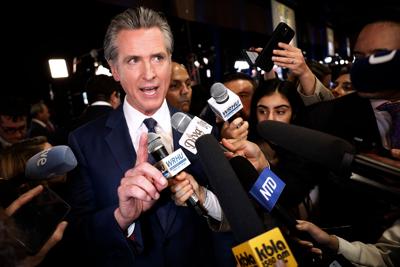
Governor Gavin Newsom talks to journalists in the media center at the Pennsylvania Convention Center before the first presidential debate in 2024. (Photo by Chip Somodevilla/Getty Images)
When Governor Gavin Newsom unveiled his budget proposal this spring, it included a sweeping reversal: starting in 2026, undocumented Californians over 19 would no longer be eligible for full-scope Medi-Cal. It’s a move aimed at closing the state’s $12 billion deficit and one that would largely affect Latino communities across Southern California.
“It’s going to affect a lot of the underserved populations,” said Jonathan Mejia, Benefits Counselor Coordinator at St. John's Well Child & Family Center in South Los Angeles. “It’s the communities that we serve day in, day out; it’s going to affect their health dramatically.”
Over the past decade, California has slowly expanded Medi-Cal to include more low-income residents, regardless of immigration status. Mejia and his team of benefit counselors at St. John’s have enrolled hundreds of undocumented patients into Medi-Cal since the state opened the program.
“I do see them come in to see their provider, staying on top of their medications,” said Mejia. “Patients are coming in, not as fearful and not worried about receiving services.”
St. John’s serves thousands of patients every year. 83% of their patients live in households with incomes at or below the Federal Poverty Level, and 74% are enrolled in Medi-Cal, the state’s health insurance program for low-income people and those with disabilities. A majority of their patients are Latino.
California first expanded full Medi-Cal coverage to undocumented children in 2016. Then, in 2019, undocumented adults up to the age of 25 were included, followed by older adults aged 50 and over, which took effect in 2022. Most recently, in January 2024, California expanded the program to offer full Medi-Cal benefits to all eligible residents, regardless of age or immigration status.
Since then, 1.6 million undocumented immigrants have signed up for Medi-Cal.
An inflating state deficit and tariffs imposed by President Donald Trump have become hurdles for the Democratic governor who once championed universal healthcare. The governor’s office says the proposed Medi-Cal rollback could save $5.4 billion by fiscal year 2028-29.
However, the California Budget and Policy Center found that undocumented Californians contribute nearly $8.5 billion in taxes annually, money that supports crucial public services like Medi-Cal.
Many state lawmakers are on the fence with Newsom’s proposal. Senator Majority Leader Lena Gonzalez, a Long Beach Democrat and co-chair of the Latino Legislative Caucus, told CalMatters that the caucus “would not support Newsom’s proposal.”
On the other side, Senator Roger Niello, a Republican from Roseville and vice-chair of the Senate budget committee, told CalMatters that the state “has committed spending to something that we can’t afford,” saying that the expansion happened “when the budget was much more flush.”
Latinos make up the vast majority of undocumented residents in California, and in regions like Los Angeles County, they are the backbone of industries such as hospitality, healthcare and construction.
Dr. Arturo Vargas Bustamante, UCLA’s Latino Policy & Politics Institute (LPPI) Faculty Director of Research, says that proposals like Governor Newsom’s threatened to undo years of progress in healthcare access and could deepen economic disparities.
“This is going to compromise the reality of these households to experience social mobility,” said Dr. Bustamante. “That cycle of social improvement may be severely compromised given that the expenses these families are going to experience are going to be deep.”
According to UCLA’s LPPI, many undocumented Latinos work in essential industries, often in low-wage jobs, without employer-sponsored health insurance. The rollback could leave these workers without access to affordable healthcare, impacting their productivity and economic stability.
“They are essentially targeting a population that systemically has been excluded for so many years,” said Dr. Vargas Bustamante. “It seems like an easy scapegoat for trying to find ways to balance the budget without thinking harder on other potential areas where spending could actually be controlled.”
The removal of Medi-Cal coverage for undocumented adults could increase out-of-pocket healthcare expenses for mixed-status families, many of whom already face financial challenges. This added burden may force families to make difficult choices between healthcare and other essential needs.
“Most undocumented immigrants don't live isolated or on their own; they live together with people of different legal status,” said Dr. Vargas Bustamante. “The long-term cost is going to come in health outcomes, but also in the financial stability of mixed-status families.”
According to the UCLA Center for Health Policy Research, approximately 20% of children in California live in mixed-status families, further illustrating the widespread nature of such households and the potential reach of policy changes affecting undocumented individuals.
As researchers warn of ripple effects—from overcrowded emergency rooms to strained community clinics—questions are mounting over what California gains by cutting coverage from some of its most vulnerable residents.
“We’d be going back to the same disaggregated and inefficient way of delivering health care,” said Dr. Vargas Bustamante. “Ultimately, the consequences are going to be paid by taxpayers now bailing out hospitals that go bankrupt, dealing with higher costs from employers, the families themselves that are going to be exposed to more catastrophic spending on out-of-pocket payments.”
As Californians wait eagerly to see what state legislators will decide later in June, those who provide healthcare to the undocumented communities attempt to calm nerves as they navigate the uncertain.
“We continue to have an open-door policy,” said Mejia. “We currently don’t have all the information, but their questions are valid. As of right now, we tell them that we will continue to serve them, nothing will stop on our side.”

















(0) comments
Welcome to the discussion.
Log In
Keep it Clean. Please avoid obscene, vulgar, lewd, racist or sexually-oriented language.
PLEASE TURN OFF YOUR CAPS LOCK.
Don't Threaten. Threats of harming another person will not be tolerated.
Be Truthful. Don't knowingly lie about anyone or anything.
Be Nice. No racism, sexism or any sort of -ism that is degrading to another person.
Be Proactive. Use the 'Report' link on each comment to let us know of abusive posts.
Share with Us. We'd love to hear eyewitness accounts, the history behind an article.